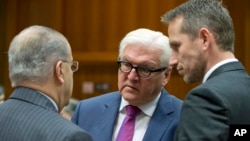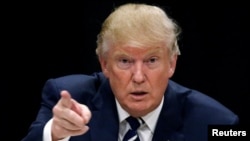Statements made by U.S. President-elect Donald Trump during his campaign made members of the European Union nervous about the future of their relations with Washington and what has until now been seen as America's steadfast commitment to guarantee the security of Europe.
EU foreign and defense ministers are anxious to learn about his plans and they met Monday in Brussels to talk about what Trump's victory means for the region's security.
Topping the concerns of EU ministers is Trump's campaign stance on NATO, after he described the alliance as obsolete. The president-elect also shook Europeans' confidence by suggesting during the campaign the United States would not automatically defend NATO members against an attack by Russia if they had not made their minimum contributions to the alliance.
Ministers going into the meetings in Brussels indicated they are not going to wait for Trump to reveal his true intentions on NATO and are now looking at the U.S. election as an opportunity to further their plans for a European defense force separate from NATO.
"Independent of the outcome of the American election, it was clear for us Europeans that we have to take over more responsibility, and today is a day where we implement a plan or given a political will that Europe is willing to take over more responsibility in form of a European defense union," said German Defense Minister Ursula von der Leyen.
Separate force
EU foreign policy chief Federica Mogherini earlier said Europe wants a "strong partnership" with the Trump administration. But on Monday, she also suggested Europe must also now look to itself to guarantee its security.
"There is a need to strengthen our security profile, it's what our citizens need," Mogherini said.
Trump's campaign statements and the prospect of their becoming reality have opened a large debate, especially in the time before the president-elect has a chance to clarify his statements and make the new White House policy on U.S. commitments to Europe's defense known.
European Commission President Jean-Claude Juncker in September raised the idea of establishing a European military headquarters, saying "common military assets" under such a setup would work in "full complementarity" with NATO.
Trump's campaign remarks appear to have fueled support in Brussels for that proposal. But the idea of a European defense force separate from NATO does not sit well with some, including those who backed Britain's June decision to leave the European Union.
Not so fast
"I think it is far better to have a straightforward defense alliance through NATO which includes all the main European Union countries and led by the United States of America than to have a separate EU army-navy arrangement as well, because I think that would create a scope for muddle and difficulty,” John Redwood, a Conservative member of Britain's parliament who campaigned for Brexit, told VOA earlier this year.
British Foreign Secretary Boris Johnson, a Brexit supporter, sought to temper the conversation Monday by urging ministers to wait and see what Trump actually proposes for NATO and Europe's security. Johnson said Trump's election is a "moment of opportunity," and he cautioned EU ministers not to undermine the "fundamental security architecture that's looked after us for the last 70 years" by jumping ahead with plans for a European defense force.





